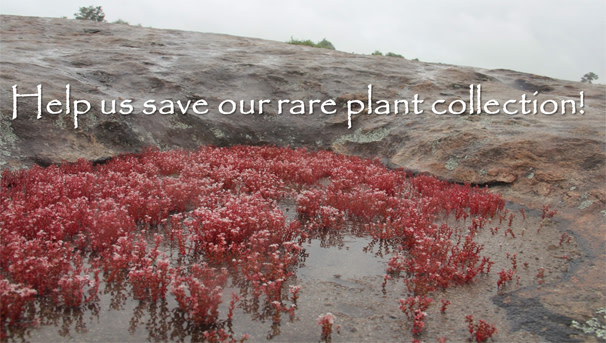Save the Emory Herbarium Rare Plant Collection

Help us save our rare plant collection
Your immediate help is needed at the Emory University Herbarium, which is home to a very rare collection of granite rock outcrop specimens requiring repair and conservation. At the completion of this project, all specimens will be made accessible for research and education through a digital web portal, featuring high-resolution images and collection data for each species. Moreover, visitors to the Emory University Herbarium will have the opportunity to view these unique plants.

What is the Emory University Herbarium?
A herbarium is a museum of preserved plant samples that are used for botanical research and education. Herbarium specimens may include pressed and mounted plants, plant parts (seeds, wood sections, and pollen), microscope slides, plant DNA, and objects made from plants. The Emory University Herbarium was founded in 1949 and currently stores more than 20,800 plant specimens. Some of the oldest herbaria in the world have specimens collected 500 years ago. With the proper care, our specimens could last as long, or even longer, to benefit future generations of students and scientists.
The mission of the Emory University Herbarium is to serve as a botanical research and educational resource for the Emory University community and beyond. The herbarium fosters understanding of the human-nature interface by collecting, preserving, researching, and exhibiting botanical specimens and ethnobotanical objects.

What is a granite rock outcrop?
Granite outcrops are exposed granitic rocks found in the Piedmont and Appalachian Mountain regions. They formed around 300 million years ago during the Paleozoic Era. Atlanta’s iconic Stone Mountain is the world’s largest mass of exposed granite. Ecological conditions on granite outcrops are harsh and differ sharply from conditions in the adjacent forest. A remarkably large number of endemic species are found in this dynamic environment, which would seem to reflect their adaptation to their isolation over a long evolutionary time period.

The Emory collection of granite outcrop species comprises specimens collected by Dr. Madeline Burbanck during the course of her professional and personal research efforts to document the flora of the rare granite rock outcropping ecosystem and, more recently, by Emory undergraduate researchers. This collection includes species denoted as rare or endangered by the United States National Forest Service. It has special research and educational value for projects relating to ecological succession, as granite outcrops are an ideal model for studying plant succession and gradient-based speciation. In addition, this collection was critical to efforts to designate Mount Arabia, Georgia, a protected National Heritage Park.
Why Your Support Matters
The collection’s status is currently in a poor state. We estimate that more than three quarters of the specimens in this collection require extensive curatorial work (repair, databasing, mounting, and imaging). Efforts to restore the collection to a state amenable to long-term conservation are dependent upon your support. Your donation will have an immediate and long-lasting effect on these environmental treasures, helping preserve them for research and education for the next several hundred years.


$25
Black-Spored Quillwort
Black-Spored Quillwort (Isoetes melanospora) is an endangered aquatic species only found in Georgia and South Carolina. The granite pools serve as home to this unique and imperiled species. Your donation helps us to perform repairs on damaged, historic specimens of this species and many others in our collection.
$50
Piedmont False Pimpernel
Piedmont False Pimpernel (Lindernia monticola) brings the colors of the sky to the rock below with its delicate light blue flowers. Your donation helps fund supplies necessary for mounting our rare and threatened specimens such as this one on acid-free herbarium quality paper for long-term durability and storage for future research and education.
$100
Little Amphianthus
Little Amphianthus (Gratiola amphiantha) is a small aquatic beauty. Its white flowers can be spotted in the granite water pools. Your donation helps cover the costs of photographing specimens like this for inclusion in our web-searchable database.
$250
Small’s Purslane
Small’s Purslane (Portulaca smallii) is a threatened species in the granite outcrop ecosystem. Your donation helps us update the names and labels of specimens in this unique collection.
$500
Granite Stonecrop
Granite Stonecrop (Sedum pusillum) is dainty and beautiful, yet threatened due to its limited environmental range. Your generous donation will enable us to repair, mount, and image up to 50 specimens composed of this and other species.
$1,000
Elf Orpine
Elf Orpine (Diamorpha smallii) brings vibrant color and life to the granite ecosystem. Your generous support will enable us to prepare 100 specimens from start to finish, ensuring their long-term conservation in our digital database and physical herbarium.



